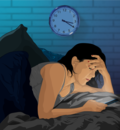Bedtime procrastination
Bedtime procrastination, also known as revenge bedtime procrastination, is a psychological phenomenon where people intentionally delay going to bed, despite knowing they will feel tired the next day. This behavior often occurs when individuals perceive that they lack control over events during the day and use the nighttime as a way to regain a sense of autonomy and freedom.
Causes[edit]
Bedtime procrastination can be attributed to several factors:
- Perceived lack of control: People who experience a lack of autonomy or control over their daily lives may engage in bedtime procrastination as a form of rebellion or self-expression.
- Difficulty disengaging from activities: Individuals may have a hard time ending enjoyable or engaging activities, leading to bedtime procrastination.
- Poor time management: Difficulty managing time effectively can contribute to delays in completing daily tasks, resulting in the postponement of bedtime.
- Stress and anxiety: High levels of stress or anxiety can make it challenging for individuals to relax and fall asleep, leading to bedtime procrastination.
Impact on Sleep and Health[edit]
Bedtime procrastination can have negative consequences on sleep and overall health:
- Sleep deprivation: Delaying bedtime can result in insufficient sleep, which can cause fatigue, mood disturbances, and cognitive impairments.
- Impaired daytime functioning: Insufficient sleep due to bedtime procrastination can lead to reduced productivity, difficulty concentrating, and increased irritability during the day.
- Increased risk of health problems: Chronic sleep deprivation has been linked to an increased risk of various health issues, including obesity, diabetes, cardiovascular disease, and weakened immune function.
Strategies for Overcoming Bedtime Procrastination[edit]
To overcome bedtime procrastination, consider implementing the following strategies: Establish a consistent sleep schedule: Going to bed and waking up at the same time every day can help regulate the body's internal clock and promote better sleep habits.
- Create a relaxing bedtime routine: Engaging in calming activities, such as reading, listening to soothing music, or practicing relaxation techniques, can help signal to the body that it is time for sleep.
- Set boundaries with technology: Limiting the use of electronic devices before bedtime can help reduce stimulation and encourage relaxation.
- Prioritize self-care: Ensuring that personal needs and well-being are attended to during the day can help reduce the need for "revenge" bedtime procrastination.
- Seek professional help: If bedtime procrastination is causing significant distress or impacting daily functioning, it may be helpful to consult with a healthcare professional or sleep specialist.
Summary[edit]
Bedtime procrastination or revenge bedtime procrastination is a psychological phenomenon, where people stay up later than they desire in an attempt to have control over the night, because they perceive themselves (perhaps subconsciously) to lack influence over events during the day.
|
|
|
-
Depiction of a person suffering from Insomnia (sleeplessness)
Ad. Transform your life with W8MD's Budget GLP-1 injections from $75


W8MD offers a medical weight loss program to lose weight in Philadelphia. Our physician-supervised medical weight loss provides:
- Weight loss injections in NYC (generic and brand names):
- Zepbound / Mounjaro, Wegovy / Ozempic, Saxenda
- Most insurances accepted or discounted self-pay rates. We will obtain insurance prior authorizations if needed.
- Generic GLP1 weight loss injections from $75 for the starting dose.
- Also offer prescription weight loss medications including Phentermine, Qsymia, Diethylpropion, Contrave etc.
NYC weight loss doctor appointmentsNYC weight loss doctor appointments
Start your NYC weight loss journey today at our NYC medical weight loss and Philadelphia medical weight loss clinics.
- Call 718-946-5500 to lose weight in NYC or for medical weight loss in Philadelphia 215-676-2334.
- Tags:NYC medical weight loss, Philadelphia lose weight Zepbound NYC, Budget GLP1 weight loss injections, Wegovy Philadelphia, Wegovy NYC, Philadelphia medical weight loss, Brookly weight loss and Wegovy NYC
|
WikiMD's Wellness Encyclopedia |
| Let Food Be Thy Medicine Medicine Thy Food - Hippocrates |
Medical Disclaimer: WikiMD is not a substitute for professional medical advice. The information on WikiMD is provided as an information resource only, may be incorrect, outdated or misleading, and is not to be used or relied on for any diagnostic or treatment purposes. Please consult your health care provider before making any healthcare decisions or for guidance about a specific medical condition. WikiMD expressly disclaims responsibility, and shall have no liability, for any damages, loss, injury, or liability whatsoever suffered as a result of your reliance on the information contained in this site. By visiting this site you agree to the foregoing terms and conditions, which may from time to time be changed or supplemented by WikiMD. If you do not agree to the foregoing terms and conditions, you should not enter or use this site. See full disclaimer.
Credits:Most images are courtesy of Wikimedia commons, and templates, categories Wikipedia, licensed under CC BY SA or similar.
Translate this page: - East Asian
中文,
日本,
한국어,
South Asian
हिन्दी,
தமிழ்,
తెలుగు,
Urdu,
ಕನ್ನಡ,
Southeast Asian
Indonesian,
Vietnamese,
Thai,
မြန်မာဘာသာ,
বাংলা
European
español,
Deutsch,
français,
Greek,
português do Brasil,
polski,
română,
русский,
Nederlands,
norsk,
svenska,
suomi,
Italian
Middle Eastern & African
عربى,
Turkish,
Persian,
Hebrew,
Afrikaans,
isiZulu,
Kiswahili,
Other
Bulgarian,
Hungarian,
Czech,
Swedish,
മലയാളം,
मराठी,
ਪੰਜਾਬੀ,
ગુજરાતી,
Portuguese,
Ukrainian



